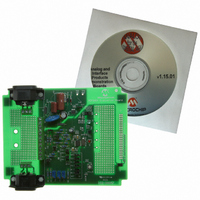MCP3905EV Microchip Technology, MCP3905EV Datasheet - Page 18

MCP3905EV
Manufacturer Part Number
MCP3905EV
Description
BOARD DEMO FOR MCP3905
Manufacturer
Microchip Technology
Type
Other Power Managementr
Specifications of MCP3905EV
Main Purpose
Power Management, Energy/Power Meter
Embedded
No
Utilized Ic / Part
MCP3905/6
Primary Attributes
1-Phase, 120/220 VAC, On Board Transformerless AC/DC 5V Supply
Silicon Manufacturer
Microchip
Silicon Core Number
MCP3905A
Kit Application Type
Power Management
Application Sub Type
Energy Meter
Kit Contents
Board & Design Guides
Product
Power Management Modules
Lead Free Status / RoHS Status
Contains lead / RoHS non-compliant
Secondary Attributes
-
Lead Free Status / Rohs Status
Lead free / RoHS Compliant
For Use With/related Products
MCP3905
Lead Free Status / RoHS Status
Lead free / RoHS Compliant, Contains lead / RoHS non-compliant
MCP3905/6 Evaluation Board User’s Guide
DS51567A-page 14
2.5.8
A low-cost DC power supply circuit is included on the MCP3905/6 Evaluation Board.
This is the same DC power supply circuit used in the MCP3905/6 Energy Meter
Reference Design. The DC power supply is created from a half-wave zener
diode-limited AC signal feeding a 7805 +5V regulator.
C
depending on the AC source expected. The board comes populated with a series
capacitor of 0.47 µF, designed to divide down an AC line voltage of 220 V
power supply is to be used with a 120 V
to 1 µF. Refer to Appendix B. “Bill-Of-Materials (BOM)” for detailed part information.
For more detail on this circuit design, as well as for 120V circuit specifications, refer to
AN994 “IEC Compliant Active Energy Meter Design Using The MCP3905/6”
(DS00994).
2.5.9
A second prototype area is included for experiments using the MCP3905 output. All
MCP3905 outputs (F
area.
2.5.10
A standard 14-pin PICtail™ daughter board connector is included on this board, as
shown in Figure 2-12. Any number of MCP3905 with PICmicro MCU meter designs
can be developed. An optical isolator is included with the MCP3905/6 Energy Meter
Reference Design as an additional level of protection for direct-connect meters using
a shunt. It is connected to the selected output of the MCP3905 via JP5. A pull-up
resistor is required on the output of the optical isolator to allow the selected logic sig-
nal to appear on the PICmicro MCU-based demo board, which is isolated entirely from
the MCP3905/6 Evaluation Board. The output of the optical isolator is connected to
RC0 on this connector, as shown in Figure 2-12. RC0 was chosen to be the default
output due to the timer1 clock input on many PICmicro
FIGURE 2-12:
The output is connected to RC0 using a 10 k
daughter board header +5V and the PICmicro
17
To A
bias to 110 or
220V with
direct-connect
meters)
and C
GND
MCP3905 OUTPUT SELECTION
(possible
16
DC Power Supply
Output Prototype Area
Connecting the MCP3905/6 Evaluation Board to a PICDEM™
Demonstration Board
divide the AC signal coming directly from the line, with their values
HF
F
F
NEG
OUT1
OUT0
OUT
Optical isolation of the MCP3905 outputs to the PICkit™ header.
OUT0
JP5
OUT
1
2
, F
OUT1
U3
, HF
3
4
OUT
RMS
10 kΩ
Pull-up
Resistor
, REVP) are brought out to the prototype
AC source capacitor, C
Ω
®
pull-up resistor to the PICtail™
MCU header, GND.
PIC
®
MCUs.
®
Daughter Board Connector
_MCU_GND
© 2005 Microchip Technology Inc.
Standard PICtail™
VCC
RC1
RC0
RC3
RC2
RC5
RC4
RA0
RA1
RA2
RA5
RA4
RA3
16
should change
RMS
11
13
14
4
5
6
7
8
9
10
1
2
3
12
. If the DC











